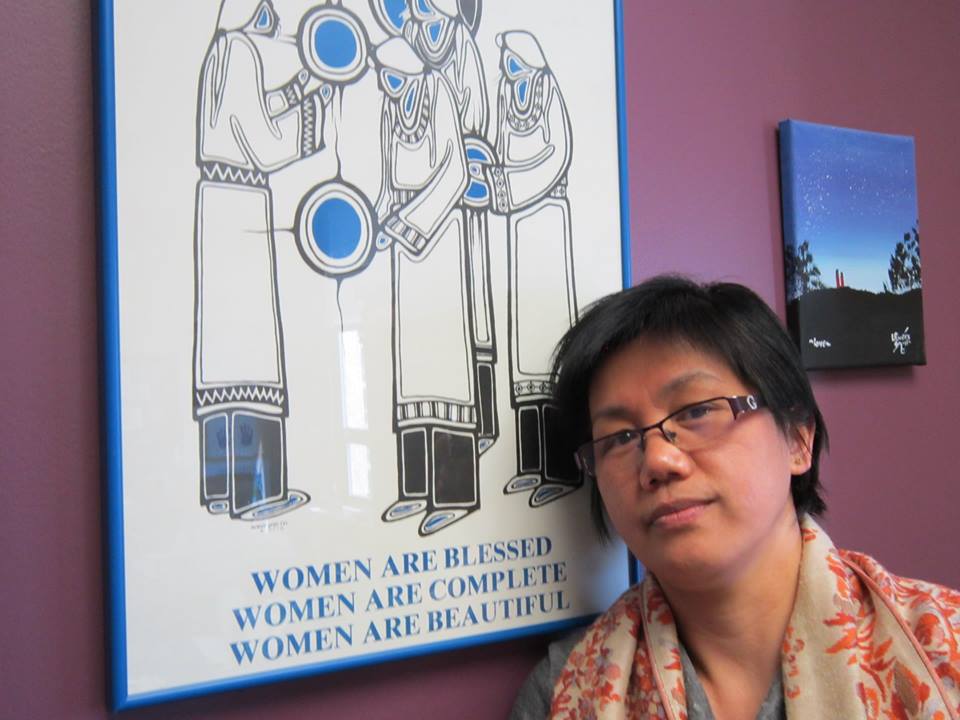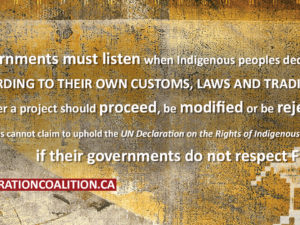What is at Stake for Indigenous Women when FPIC is not respected?

Vernie Diano from Innabuyog, a KAIROS partner in the Philippines, attended the 59th session of the UN Commission of the Status of Women (CSW) in New York last month. In the following statement, made at an event organized by the Asia Pacific Forum on Women, Law and Development (APWLD), she clarifies what is at stake for Indigenous women when Free Prior and Informed Consent (FPIC) is not respected:
What is at stake for indigenous women? We lose our role to be managers of agricultural production and natural resources. We lose our role in building community harmony and solidarity. We lose our safety and protection when government uses militarization and violent means of intimidation, harassment, vilification and even extrajudicial killing to repress our legitimate actions to defend our land, life and resources. We lose our dignity when sexual violence particularly rape, is used to humiliate our communities.
http://www.cwearc.org/main/press-releases-3/201-beijing-20
Beijing + 20: Broken Promises and the Need for Accountability
Written by Vernie Yocogan-Diano.
Human rights of indigenous women are rooted on the respect of indigenous peoples’ right to self-determination. Human rights of indigenous women are deeply connected to ancestral lands and territories. It is this connection and identity that makes indigenous women distinct from other women.
Indigenous women made a big milestone during the Beijing Women’s Conference. The aspirations of indigenous women to equality and empowerment were embodied in an Indigenous Women’s Declaration which up to now is referred to by indigenous women’s organizations in their continued engagements with governments and international bodies for the respect, protection and fulfillment of indigenous women’s rights. One of our leaders in the Cordillera indigenous women’s movement, Leticia Bulaat joined the indigenous women’s delegation in Beijing to share how the indigenous women’s movement in our region asserted and defended the right to self-determination where indigenous women were able to decide on the utilization and development of the resources in an integrated and sustainable way according to our Cosmo vision. Twenty years later, Leticia vividly recalled that the Declaration underscored the full disclosure of development projects and investments made in indigenous territories and that indigenous territories ravaged by mining corporations, or which have become dumping sites of toxic, radioactive and hazardous wastes, should be rehabilitated by the corporations or the governments , which allowed this devastation. The Declaration also had a strong statement for governments to address human rights violations and violence against indigenous women, a stop to genocidal and ethnocidal practices, demanded investigation of reported cases of sexual slavery and the rape of indigenous women by the military happening in areas of armed conflict.
The Beijing Declaration of Indigenous Women also presented a strong critique that the Beijing Platform for Action does not address the structural cause of poverty nor does it address the structural cause of conflicts that put women in a more adverse condition.
It was not only in Beijing that these aspirations and demands were articulated. These issues continue to be pushed as the government has hardly delivered its responsibility. In the Philippines, while a contentious issue, there is the Indigenous Peoples Rights Act which is meant to protect and uphold the rights of indigenous peoples. An implementing body was created for this, the National Commission of Indigenous Peoples under the Office of the President (the same level as that of the Philippine Commission of Women). The law is in place, the implementation body is in place. Yet indigenous women are now placed in an even more perilous situation of losing their access and control to ancestral land, territories and resources. They are also exposed to various forms of violence whenever they are made to defend their land, life and resources. This is because Philippine laws and policies on land and resources are framed within the colonial regalian doctrine that all land and resources belong to the state. Prior to the controversial Indigenous Peoples Rights Act is the Philippine Mining Act of 1995 which gives all powers and rights to mining corporations and denies all rights to indigenous peoples. This is only one picture where the Philippine government comes in conflict with its duty to uphold human rights. On one hand it is signatory to almost all international human rights instruments, on the other hand it creates national laws and policies which are inimical and contradictory to international human rights standards. A few positive laws and action plans e.g. Magna Carta of Women, Framework Plan for Women, are in place not because government have sincerely thought of these, these were fought for by movements of women and various sectors.
How indigenous women are pushed further back? The Indigenous People’s Rights Act and the office of the National Commission of Indigenous Peoples have protected more the corporations than indigenous peoples. The law and its implementing body have served as a mouthpiece and defenders of mining and other corporations or investments. Indigenous territories continue as havens of mining corporations. More than 60% of the Cordillera land is covered by active mining projects and applications. Energy projects in the guise of promoting renewable energy and climate change mitigation are outlined in support of mining projects and other investments promoted by government in the region and in the country. Government uses its own security agencies–the military, policy and paramilitary units in securing corporate investments. Not only that, it has created an Investment Defense Force where corporations can hire government security agencies to protect their projects. The National Internal Security Plan systematically divides communities coopting tribal leaders to become tribal dealers for corporations. Violence and community conflicts are induced further with the creation of local defense forces among indigenous communities by the state security forces.
What is at stake for indigenous women? We lose our role to be managers of agricultural production and natural resources. We lose our role in building community harmony and solidarity. We lose our safety and protection when government uses militarization and violent means of intimidation, harassment, vilification and even extrajudicial killing to repress our legitimate actions to defend our land, life and resources. We lose our dignity when sexual violence particularly rape, is used to humiliate our communities.
This situation where corporate greed and hegemony have taken over indigenous peoples’ resources, obviously presents a broken promise of the Beijing platform for action.
The moment calls for stronger movements of indigenous women to press government’s accountability. Indigenous women’s organizations along with people’s movements have not failed in reminding and pressing the Philippine government of its duties. We still have to receive sincere actions of the Philippine government to rectify its culpability for the extrajudicial killings of 7 indigenous women and 7 children from 50 cases of extrajudicial killings among indigenous peoples since 2010 nationwide and other human rights violations. We still have to receive concrete actions of the Philippine government on the fraudulent and corrupted practice of free prior and informed consent that oftentimes compromise the security of indigenous women leaders and organizations who reject corporate projects. We still have to receive actions from the Philippine government to repeal oppressive laws like the Philippine Mining Act 1995 and reframe its national economic policy that provides long term and sustainable economic well-being of women and the people, and a national security plan that guarantees the comprehensive human rights of the people. We are urging the Philippine government to resume peace talks with the revolutionary organizations where the roots of armed conflict are comprehensively tackled and a clear plan of action is defined.
I will repeat what had been said many times over: The Philippine government must account now as justice is long overdue and impunity is over-extended and never to be tolerated. Matago-tago tako (long live), let us persevere in the noble struggle to put reality on gender equality and women’s empowerment with the implementation of Beijing plus 20 and a Post-2015 sustainable development goals that will sincerely reduce inequalities of the North and South, between the poor and the rich and between men and women and redistribute wealth, power, resources and opportunities.
——————————————————————————–
Presented on March 18,2015 in the event organized by the Asia Pacific Forum on Women, Law and Development (APWLD) at the 59th Commission on the Status of Women












